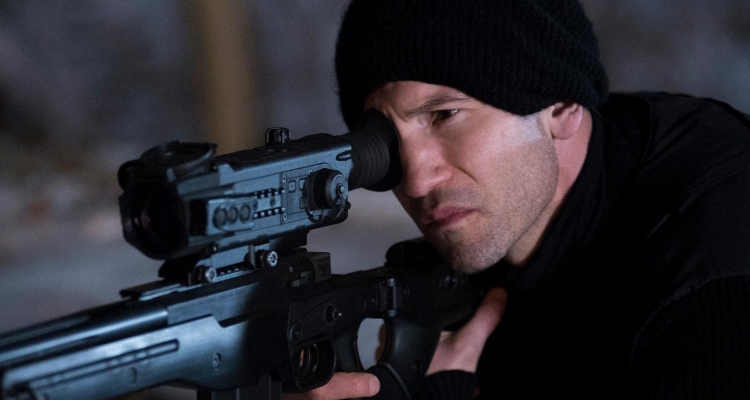But when I started asking about the anti-hero aspect of the series and the morally grey texture of Frank Castle, the showrunner lit up. Clearly, this is the psychological meat of the show he loves.
“He’s a classic anti-hero and we talked about Westerns and ‘70s movies in that age of the anti-hero,” he explained. “There’s a side of Frank that would be the best friend you could have. He’s the guy you would want in your corner. He’s got a very strong moral code and he’s honorable, he doesn’t lie, and he’d lay down his life for you. On the other side of it, his actions are inexcusable and should never be pardoned. The idea of a guy, who is his view, is doing the wrong thing for the right reasons, is very interesting and really complex. Doing the show, we were very keen to show the cost of those actions — both emotionally and physically.”
And that toll is high. In the show, Bernthal is like a living ghost, trapped in the past, haunted by his family, but now that he’s vanquished recent foes, the Punisher is just looking to lay low and figure out a way forward through life that doesn’t include a bullet in the head. But like many, classic anti-hero stories, the past just isn’t finished with Frank. What evolves from there is a thriller and conspiracy story told against the backdrop of Castle’s psychological angst, that reignites his rage and dormant need for revenge, all the while trying to balance doing the right thing for the people he still cares about. And his empathy for those around him grows when he is forced out of the shadows and obliged to deal with others. But violence follows him around like a plague of his own making.
“Much of the show is about his relationship to violence past and present,” he said. “What happened to his family is because of his past action. I think part of the journey of the show is, ‘Well, these guys are responsible for [my family’s deaths,] but I cannot deny some of the blame.’ Early on, we talked with Marvel about the concept: once you take the hand of violence, you can’t let go of it and it won’t let go of you. You’ll be caught in that cycle.”
What gives Frank some sense of purpose is crossing paths with the Micro (Ebon Moss-Bachrach from “Girls”), a former NSA analyst whose family believes he’s dead. Without too many spoilers, the men come to realize they’re on the same side and start pulling the thread of what is a larger conspiracy. This element of the show is a twist and gives “The Punisher” dimensions of a chamber drama and buddy story, as the two men bunker down together. What emerges is a story about men, their families, and their extended tribes.
“I think it’s important with any narrative to make it universal and give the audience something to empathize with,” Lightfoot said, discussing one of their trickier elements of the show’s dynamics. “Very few of us are special forces and have been on the journey that Frank has, but we can all empathize with loss, grief and the emotions he goes through. So, what I was really excited about, amidst everything else, was a show about two guys sharing an apartment who really miss their families and one of them has a chance to get them back and one of them never can. And that sort of roommate story was something we were always really excited to tackle and tell.”
As I probably should have assumed, Lightfoot is pretty disinterested when it comes to discussions of “The Punisher” crossing over with “The Defenders” or any of the other shows, and to some degree, those decisions are above his pay grade. “I certainly haven’t been party to any of those discussions,” is all he’ll allow. But he does say he’s keen on continuing with season two if the powers that be deem “The Punisher” a success. And knowing Marvel’s track record on Netflix so far, that seems like a done deal.
But fans should know the show is in good hands. For Lightfoot, it’s not about a comic book emblem, a costume or surface ideas about The Punisher: it’s all about the character, understanding who Frank Castle is, his motives and the complicated struggle he has in finding a purpose beyond just pure vigilantism.
“We tried to make the show about Frank Castle learning that it’s not enough to fight a war, you have to have something worth fighting for,” he explained. “Vengeance, in the end, is an empty aim. The show then becomes about Frank. He’ll never get his family back, but Micro could one day, and that’s what he’s fighting for.”
Marvel’s “The Punisher” is now streaming on Netflix.

